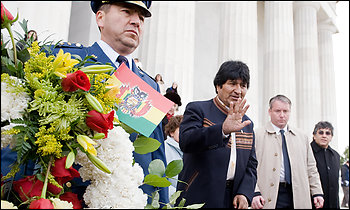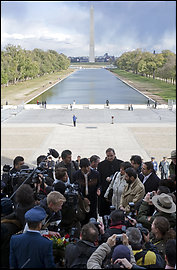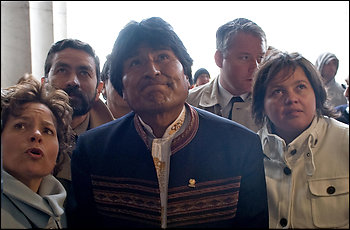Evo Pays a Socialist Call
Bolivia's Morales Makes Most of First D.C. Visit
November 22, 2008 - Washington Post
By Pamela Constable, Washington Post Staff Writer
The students buzzed excitedly as they stood in the freezing dark at American University while Secret Service agents searched their backpacks. They filled one auditorium and overflowed into another, waiting to see a Latin American leader who has become a folk hero to his poor countrymen in Bolivia -- even as he has alienated its elite, alarmed U.S. officials and polarized the area's Bolivian immigrant community.
 (left) The Bolivian president places a wreath at the Lincoln Memorial, one of many stops. (Photo: By Kevin Clark -- The Washington Post)
(left) The Bolivian president places a wreath at the Lincoln Memorial, one of many stops. (Photo: By Kevin Clark -- The Washington Post)
There were grizzled professors and nonprofit types in the reserved seats, chatting of bygone wars and revolutions, mentioning Salvador Allende and Che Guevara and Fidel Castro. A hush fell as Bolivian President Evo Morales strode in, flanked by security men, and the entire room rose in a standing ovation.
Morales, a handsome man of 48 with a shock of thick black hair, looked every bit the part of an indigenous peasant leader turned politician. He wore a simple collarless jacket and a rough white cotton shirt with no tie. When he spoke, in Spanish, it was not to tackle the host of thorny U.S.-Bolivian issues but to present his version of Bolivia's tortured racial history and of his own quest for power.
"I come from a majority that was always the most excluded, the most hated, the most marginalized, the most humiliated," he said. At one time, Bolivia was so racially stratified that Aymara Indians, such as his grandparents, "were not even allowed to enter the cities." Even a decade ago, when indigenous leaders tried to engage in politics, he said, "we were told our only political rights were the pick and the shovel."
There seemed to be pain in his words, but there were also flashes of combative glee when Morales described taking on the mixed-race and European establishment and running for office. He was elected president in 2005 after gaining national notoriety as head of the union of farmers who grow coca, a traditional crop that is chewed to combat fatigue but is also the basis for cocaine.
 Since Morales took office, the impoverished nation of Bolivia has become increasingly divided, with sporadic violent clashes between his supporters among the indigenous and working poor, and his adversaries in more-affluent regions and in the private sector. This week, during his first-ever visit to Washington, he insisted he would adhere to the democratic process but reiterated his vows to empower the poor, eradicate illiteracy and keep public services out of private hands.
Since Morales took office, the impoverished nation of Bolivia has become increasingly divided, with sporadic violent clashes between his supporters among the indigenous and working poor, and his adversaries in more-affluent regions and in the private sector. This week, during his first-ever visit to Washington, he insisted he would adhere to the democratic process but reiterated his vows to empower the poor, eradicate illiteracy and keep public services out of private hands.
(right) Morales, who drew a crowd wherever he went, made the Lincoln Memorial his first stop; his last was an equally symbolic visit to the National Museum of the American Indian. (Photo: By Kevin Clark -- The Washington Post)
"When I won the presidency, people said, 'That poor little Indian won't last six months,' " Morales told the students, grinning triumphantly and evoking appreciative laughter from audience members, many of whom were listening to an English interpretation through headphones. "But I am still here, so now they say, 'That little Indian is going to be around for a long time, so we better do something about it.' "
In many ways, Morales's visit was a scripted, carefully timed effort to present a version of himself and his government that contrasts sharply with the image that his critics here and in Bolivia have promoted: a dangerous socialist, apologist for drug trafficking and stooge of powerful leftist figures such as Castro and Venezuelan President Hugo Chavez.
Morales is persona non grata at the White House and the State Department. He recently expelled the U.S. ambassador, accusing him of conspiring with Morales's domestic enemies; he also banished the U.S. Drug Enforcement Administration's team in Bolivia, saying that its members were pursuing a political vendetta in the guise of anti-drug activities. But he chose other, more public settings in the U.S. capital to showcase his stature and draw hopeful parallels with the incoming Obama administration.
His first stop was the Lincoln Memorial, where he placed a wreath and looked up reverently at the Great Emancipator while the cameras clicked. His last stop was the National Museum of the American Indian, again accompanied by the Bolivian and international press, where the fact of his political power contrasted wordlessly with the tableaux of humble indigenous figures.
Still, if Morales expected to control the image that came out of his visit, he wasn't counting on the determination of his local adversaries. When he arrived at the Organization of American States' headquarters to deliver a formal speech, nearly 100 protesters, mostly middle-class Bolivian immigrants, were waiting outside with bullhorns and placards. For more than an hour, they denounced him angrily as an "assassin" and "communist" and "narco-dictator."
 (left) The Bolivian president gazes up reverently at the statue of the Great Emancipator. (Photo: Kevin Clark - The Washington Post)
(left) The Bolivian president gazes up reverently at the statue of the Great Emancipator. (Photo: Kevin Clark - The Washington Post)
Inside, Morales tried to reprise the speech that had wowed his American University audience. He mentioned his impoverished youth, and he spoke of wanting to bring justice and equality to his homeland. He accused the DEA of tapping his phones; he laughed at the newspapers that had made fun of him. He held up a little copy of his proposed constitution; he invoked the names of Lincoln and Martin Luther King Jr. and the legendary South American indigenous leader Tupac Amaru.
But the regional diplomats, whose organization had called a special session to hear Morales speak, gave him a cooler reception. Some of the ambassadors -- many of them elite members of societies that have experienced their own civil conflicts and peasant revolutions -- seemed to admire him but also expressed concern about his leftist alliances and championing of indigenous rights.
"I like him, and I know this change had to come sooner or later," confessed one impeccably dressed Latin American envoy. "But I cannot tell you how difficult it is for many people in a country like mine to accept the idea that everyone is equal."